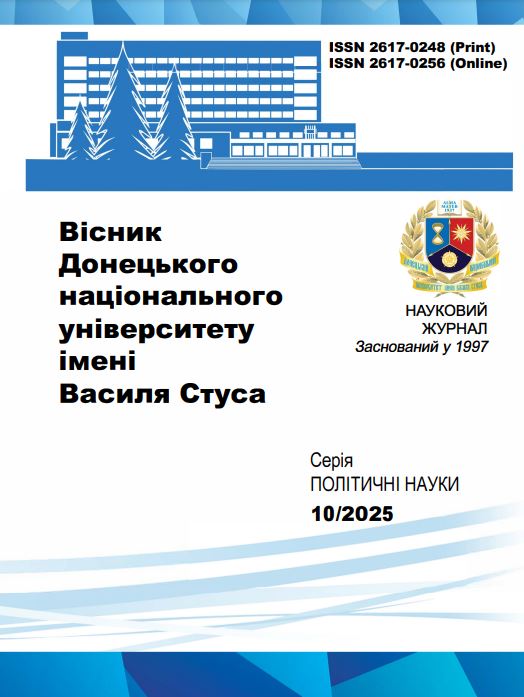The evolution of neopatrimonial science in Ukraine
DOI:
https://doi.org/10.31558/2617-0248.2025.10.3Keywords:
neopatrimonial science, political regime of Ukraine, academic degrees, heads of regional state administrations, heads of regional councils of UkraineAbstract
The article is devoted to the evolution of neopatrimonial science in Ukraine, that is, a system of significant and performative interactions of scientists with businessmen and officials, which is determined by the relevant political regime. Its purpose is to trace the further dynamics of the processes of obtaining the academic degrees by Ukrainian officials during 2014–2024. The main hypothesis is that the main feature of neopatrimonial science is the formation of academic capital by using administrative means of managing it. The empirical basis of the work is careers of heads of regional state administrations (governors) and regional councils of Ukraine during 1992–2024. The careers of 642 former and current governors and/or heads of regional councils during 1992–2024 were analyzed, of whom 269 obtained 354 academic degrees. It was found out that academic degrees were most often obtained by representatives of the executive branch and half as often by representatives of local self-government. Almost equal numbers are accounted for by representatives of business entities and «siloviki», while that of the legislative branch and, especially, civil society is very small. These data correspond to the hypothesis that the political and economic spheres are differently important in obtaining the academic degree and that the former is differentiated internally according to the logic of neopatrimonialism. In particular, success in neopatrimonial science is associated with control over political positions, while representatives of the executive branch have more favorable opportunities to establish control over the administrative means of accumulating academic capital in Ukrainian science. In general, neopatrimonial science is a derivative of Ukrainian political regime and is largely structured by the forces that determine the political development of the country. At the same time, the expansion of the degree seekers by the «involvement» of representatives from «siloviki» and civil society as well as the increase of representatives from local government raises the question of the next stage of transformation of neopatrimonial science.
References
Bourdieu P. Homo Academicus. Redwood City: Stanford University Press, 1988. 344 p.
Осин В. Академия и политический режим: неопатримониальная наука в Украине (и Молдове). Ab Imperio, 2014. №3. С. 295–360.
Осин В., Зеленски А., Шуляк С. Власть и знание на постсоветском пространстве: политический режим, научная степень, идеология и карьера в Украине и Молдове. Вильнюс: ЕГУ, 2014. 376 с.
Ezell A. Academic fraud and the world’s largest diploma mill. College and University, 2019. Vol. 94, Iss. 4, Pp. 39–46.
Осипян А. Українські політики й фальшиві дисертації. Дзеркало Тижня, 16 червня 2017. URL: https://zn.ua/ukr/science/ukrayinski-politiki-y-falshivi-disertaciyi-245793_.html.
Blondel J., Müller-Rommel F., Malovà D. Governing new European democracies. London: Palgrave Macmillan UK, 2007. 251 p.
Gaxie D., Godmer L. Cultural capital and political selection: educational backgrounds of parliamentarians. Democratic Representation in Europe (ed. by H. Best, M.Cotta). Oxford: Oxford University Press, 2007. Pp. 106–35.
Pinto A., Almeida P. Portugal: the primacy of “independents”. The Selection of Ministers in Europe (ed. By K. Dowding, P. Dumont). New York: Routledge, 2008. Pp. 147–158.
Bourdieu P. The specificity of the scientific field and the social conditions of the progress of reason. Social Science Information, 1975. Issue 14, 6 (December). Pp. 19–47.
Clifton H., Chapman M., Cox S. “Staggering” trade in fake degrees revealed. BBC, January 16, 2018. URL: https://www.bbc.com/news/uk-42579634.
Кречетова Д. Про експерименти з вишами, НУШ і відмову від ступеня. Інтерв’ю з Оксеном Лісовим. Українська правда, 28 березня 2024. URL: https://life.pravda.com.ua/society/nush-eksperimenti-z-vishami-i-zaklik-do-studentiv-interv-yu-z-ministrom-osviti-300747/ .
Fisun O. Rethinking post-Soviet politics from a neopatrimonial perspective. Demokratizatsiya, 2012. 20(2). Pp. 87–96.
The development of political science: a comparative survey / Easton D., Gunnel J., Graziano L. (editors). London: Routledge, 1991. 306 p.
Regime and discipline: democracy and the development of political science / Easton D., Gunnel J., Stein M. (editors). Ann Arbor: University of Michigan Press, 1995. 293 p.
Political science in history: research programs and political traditions / Farr J., Dryzek J., Leonard S. (editors). Cambridge and New York: Cambridge University Press, 1995. 378 p.
Political science in Europe: achievements, challenges, prospects / Boncourt Th., Engeli I., Garzia D. (editors). London: Rowman & Littlefield, 2020. 348 p.
Opportunities and challenges for new and peripheral political science communities / Ilonszki G., Roux Ch. (editors). Cham: Springer International Publishing, 2022. 281 p.
Political science in Europe at the beginning of the 21st century / Krauz-Mozer B., Kułakowska M., Borowiec P., Ścigaj P. (editors). Kraków: Jagiellonian University Press, 2015. 612 p.
Political science in Central-East Europe: diversity and convergence / Eisfeld R., Pal L. (editors). Verlag Barbara Budrich, 2010. 317 p.
Three social science disciplines in Central and Eastern Europe: handbook on economics, political science and sociology (1989-2001) / Kaase M., Sparschuh V., Wenninger A. (editors). Berlin: Informationszentrum Sozialwissenschaften; GESIS Servicestelle Osteuropa; Collegium Budapest, Institute for Advanced Study, 2002. 668 p.
Ravecca P. Politics of political science: re-writing Latin American experiences. New York: Routledge, 2019. 292 p.
Eisenstadt Sh. Revolution and the transformation of societies: a comparative study of civilizations. New York: Free Press, 1978. 348 p.
Зоткин А. «Львы» и «лисы» украинской политики. Киев: Институт социологии НАН Украины, 2010. 341 c.
Hale H. Patronal politics: Eurasian regime dynamics in comparative perspective. Cambridge: Cambridge University Press, 2014. 538 p.

